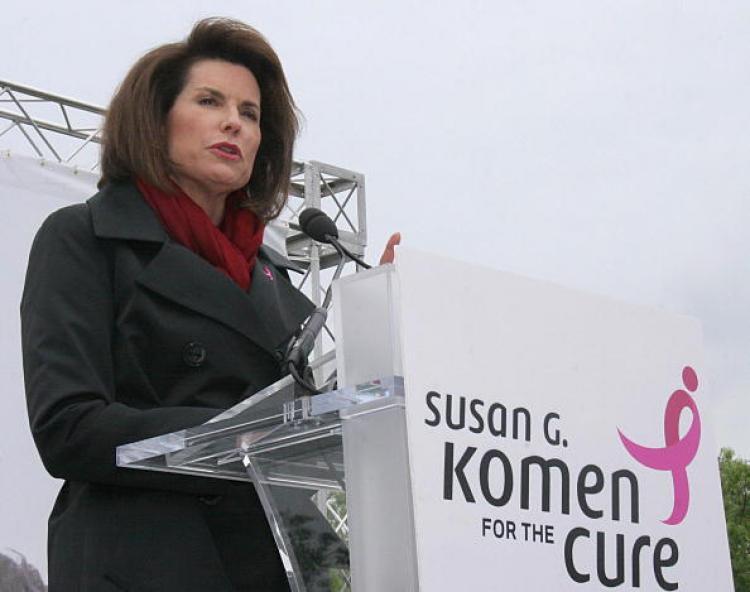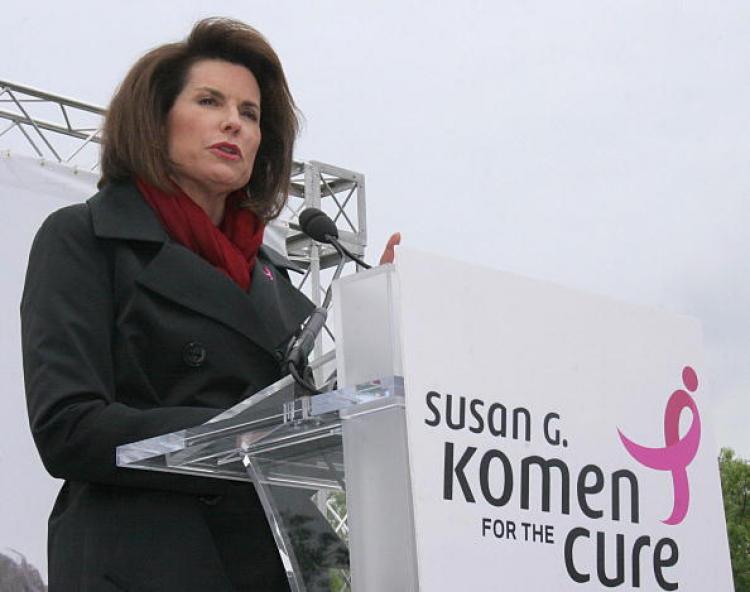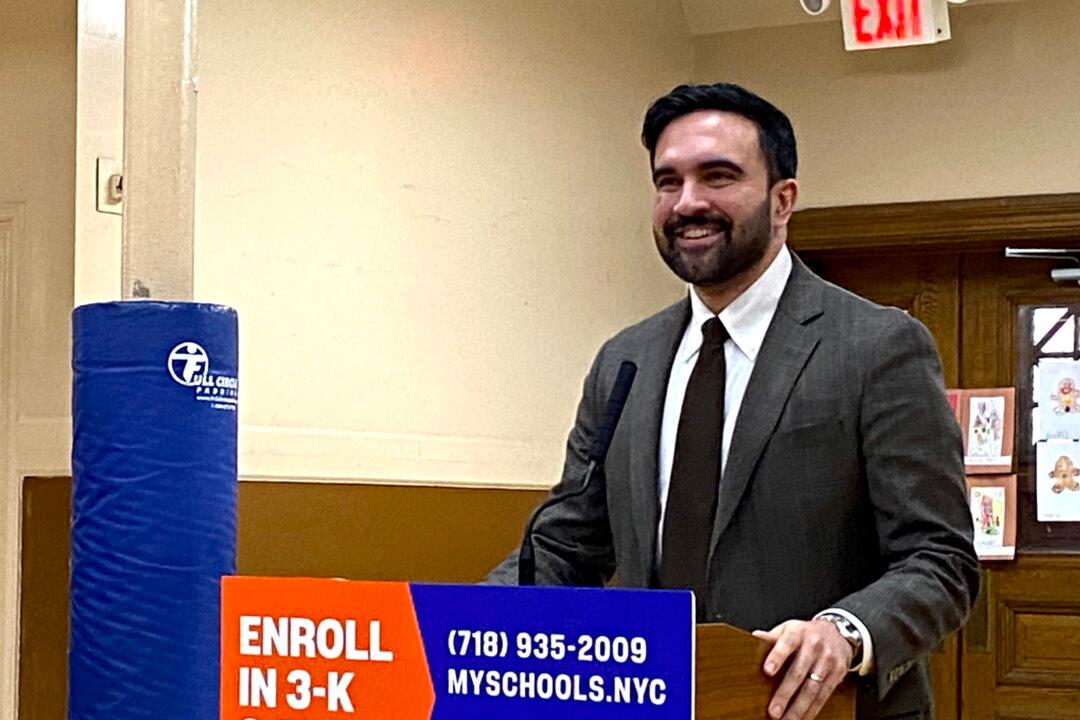WASHINGTON—Healing and caregiving, basic goals for medical professionals, are not often part of the health care debate. Sometimes patients just need a doctor to say, “You are all right, take two aspirins and see how you are in the morning,” said Ambassador Nancy Brinker.
She was speaking on a panel Tuesday at a Health Care Forum hosted by The Atlantic. The forum was held at Washington, D.C.’s Ronald Reagan Building.
“High touch, low tech,” said moderator Corby Kummer, rephrasing Brinker’s point about the need to emphasize caregiving over technical skill. Kummer is a senior editor at The Atlantic.
Panelist Dr. Harvey Fineberg, president of the Institute of Medicine at the National Academies, agreed that solid medical training should enable “physicians to practice, regardless of the range of skill they may have, always knowing, remembering, that there is a human being in need with whom they have a very special relationship.”
He continued, “If you begin with that mindset [of serving the needs of the patient] it is the most natural thing in the world for the physicians to embrace the inclusion of other caregivers who can enhance the healing experience of the patient.”
Other caregivers working alongside doctors might include nurses, nurse practitioners, counselors, and mental health experts.
According to Lynne Fagnani, senior vice president at the National Association of Public Hospitals, the recent health care legislation, “actually is trying to encourage a movement toward team-based care.”
She said the legislation provides incentives to place emphasis on patient healing, ”If you look at some of the incentives in the health reform legislation they are really driven at trying to create integrated care.” Fagnani also spoke on Tuesday’s panel.
Congressman Waxman Interviewed
Energy and Commerce Committee Chairman Rep. Henry Waxman, (D-Calif.) who oversaw writing health care legislation, was interviewed at the forum by Atlantic Senior Editor Joshua Green.
Asked about pivotal times in the process of passing health care legislation, the congressman spoke of the death of Sen. Edward Kennedy. Loss of Kennedy meant loss of a longtime national health care supporter and loss of the 60-40 Democratic majority in the Senate.
At that time, Waxman said, Democrats and the president considered scaling the legislation back to win more Republican support. In the end, “Obama stood his ground.” They realized, he said, Republicans would oppose any Democrat-sponsored health care bill. Scaling it back would not win bipartisan support.
Asked about pushing for more preventive care, Waxman explained that when the Democrats added preventive measures to the bill, the Congressional Budget Office calculated them only as costs, rather than as costs and credits. He indicated that this discouraged preventive measures.
“Its common sense, if you can prevent an illness, you save the money you would spend on treating the person with the illness,” he said.
Under the new legislation, people on Medicare will right away be able to receive preventive services without co-pays.
“There is just such a clear moral case that we ought to try to keep people healthy,” said the congressman.
When asked whether Republican opposition might lead to the repeal of the health care bill, Waxman said he does not believe so. In his view, the Republicans would not gain popularity if they repealed the law and took insurance away from those with pre-existing conditions. The legitimacy of the legislation is conferred by the fact that it is law, not by Republican support or opposition, he said.
She was speaking on a panel Tuesday at a Health Care Forum hosted by The Atlantic. The forum was held at Washington, D.C.’s Ronald Reagan Building.
“High touch, low tech,” said moderator Corby Kummer, rephrasing Brinker’s point about the need to emphasize caregiving over technical skill. Kummer is a senior editor at The Atlantic.
Panelist Dr. Harvey Fineberg, president of the Institute of Medicine at the National Academies, agreed that solid medical training should enable “physicians to practice, regardless of the range of skill they may have, always knowing, remembering, that there is a human being in need with whom they have a very special relationship.”
He continued, “If you begin with that mindset [of serving the needs of the patient] it is the most natural thing in the world for the physicians to embrace the inclusion of other caregivers who can enhance the healing experience of the patient.”
Other caregivers working alongside doctors might include nurses, nurse practitioners, counselors, and mental health experts.
According to Lynne Fagnani, senior vice president at the National Association of Public Hospitals, the recent health care legislation, “actually is trying to encourage a movement toward team-based care.”
She said the legislation provides incentives to place emphasis on patient healing, ”If you look at some of the incentives in the health reform legislation they are really driven at trying to create integrated care.” Fagnani also spoke on Tuesday’s panel.
Congressman Waxman Interviewed
Energy and Commerce Committee Chairman Rep. Henry Waxman, (D-Calif.) who oversaw writing health care legislation, was interviewed at the forum by Atlantic Senior Editor Joshua Green.
Asked about pivotal times in the process of passing health care legislation, the congressman spoke of the death of Sen. Edward Kennedy. Loss of Kennedy meant loss of a longtime national health care supporter and loss of the 60-40 Democratic majority in the Senate.
At that time, Waxman said, Democrats and the president considered scaling the legislation back to win more Republican support. In the end, “Obama stood his ground.” They realized, he said, Republicans would oppose any Democrat-sponsored health care bill. Scaling it back would not win bipartisan support.
Asked about pushing for more preventive care, Waxman explained that when the Democrats added preventive measures to the bill, the Congressional Budget Office calculated them only as costs, rather than as costs and credits. He indicated that this discouraged preventive measures.
“Its common sense, if you can prevent an illness, you save the money you would spend on treating the person with the illness,” he said.
Under the new legislation, people on Medicare will right away be able to receive preventive services without co-pays.
“There is just such a clear moral case that we ought to try to keep people healthy,” said the congressman.
When asked whether Republican opposition might lead to the repeal of the health care bill, Waxman said he does not believe so. In his view, the Republicans would not gain popularity if they repealed the law and took insurance away from those with pre-existing conditions. The legitimacy of the legislation is conferred by the fact that it is law, not by Republican support or opposition, he said.





